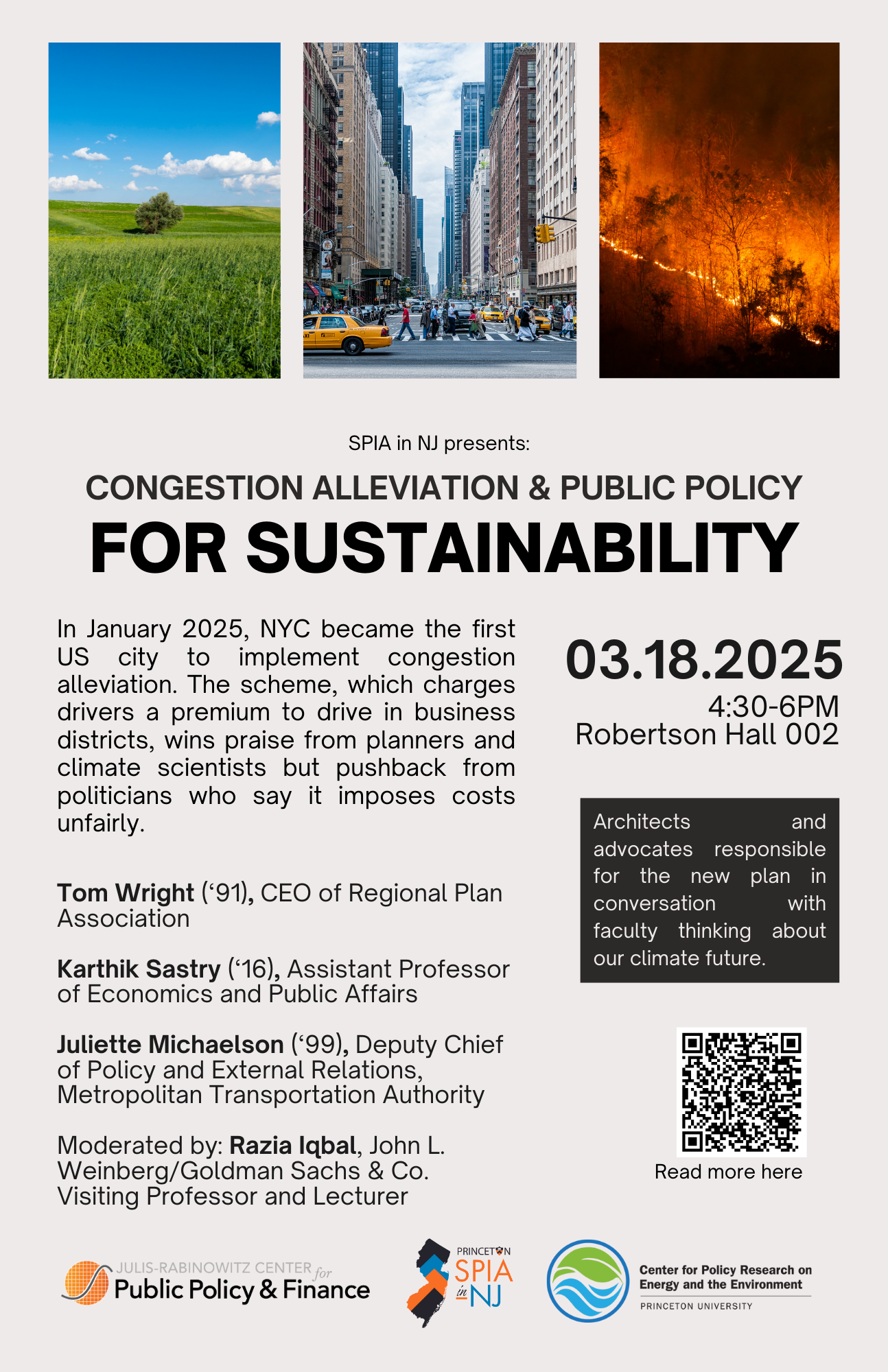
London's had it for almost 20 years. Singapore for nearly fifty. Rome and Stockholm are among other cities worldwide that use this measure to discourage single-use vehicles and raise revenue for public transportation.
In January 2025, NYC became the first US city to implement congestion alleviation. The scheme, which charges drivers a premium to drive in business districts, wins praise from planners and climate scientists but pushback from politicians who say it imposes costs unfairly.
This panel will feature some of the architects and advocates responsible for the new plan in conversation with faculty thinking about our climate future. Co-sponsored by the Julis-Rabinowitz Center for Public Policy and Finance (JRCPPF) and Center for Policy Research on Energy & the Environment (C-PREE).
Panelists:
Juliette Michaelson ('99), Deputy Chief of Policy and External Relations, Metropolitan Transportation Authority (MTA)
Juliette Michaelson is the deputy chief of policy and external relations at the Metropolitan Transportation Authority (MTA). There, she oversees a number of high-profile initiatives, including New York’s transformative Congestion Relief program.
Prior to the MTA, Juliette was executive vice president at Regional Plan Association, where she led the production of the 2017 Fourth Regional Plan, a long-range strategic plan for the New York tri-state area. Before RPA, Juliette worked at Project for Public Spaces, advising public agencies on transportation and land-use decisions.
Juliette received a bachelor's in political science from Princeton University and a master's in urban planning from Columbia University.
Karthik Sastry ('16), Assistant Professor of Economics and Public Affairs
Karthik Sastry is an Assistant Professor of Economics and Public Affairs at Princeton University in the Department of Economics and the School of Public and International Affairs. His research focuses on the macroeconomic consequences of new technologies, environmental change, and bounded rationality. Karthik received his PhD in Economics from the Massachusetts Institute of Technology in 2022 and was a Prize Fellow in Economics, History, and Politics at Harvard University from 2022-2023.
Tom Wright ('91), CEO & President of Regional Plan Association (RPA), the nation’s oldest independent metropolitan research, planning and advocacy organization.
As president, Tom led the production of RPA’s landmark Fourth Regional Plan, released in 2017, which proposed 61 recommendations to reform public institutions; modernize transportation systems; tackle the challenge of climate change; and provide affordable and livable communities for all the region’s residents. RPA is now working to implement the major ideas in the plan, such as charging all drivers to enter the Manhattan CBD; cutting carbon emissions and scaling up renewable energy sources; creating healthy, affordable housing in every community; modernizing the NYC subways; and building a new commuter rail tunnel under the Hudson River connected to a renovated and expanded Penn Station.
Previously, Tom was deputy executive director of the 2001 New Jersey Office of State Planning, where he coordinated production of the New Jersey State Development and Redevelopment Plan.
In January, 2020, Governor Phil Murphy appointed Tom as the Chairman of the New Jersey State Planning Commission. A visiting lecturer at the Columbia University Graduate School of Architecture, Planning and Preservation, Tom has a master’s in urban planning from Columbia University and a bachelor’s in history and a certificate in American Studies from Princeton University.
Moderated by: Razia Iqbal, John L. Weinberg/Goldman Sachs & Co. Visiting Professor and Lecturer
Razia Iqbal has been a journalist with BBC News for more than three decades. She comes to SPIA as the John L. Weinberg/Goldman Sachs & Co. Visiting Professor and Lecturer. From 2011-2023, she was the main anchor of Newshour, an international current affairs radio program on the World Service, heard by millions in the U.S. It is an agenda-setting show, holding newsmakers to account and helping to make the BBC a trusted news brand in America. She has also reported from around the world, including election coverage in the US, Germany, Turkey and India. She was the BBC’s arts correspondent for TV and Radio for ten years. Iqbal has presented in-depth interview programs as well as documentaries for both radio and television. She is a frequent moderator at political and literary events. During the spring semester of 2022, she was a visiting lecturer in the Humanities Council and one of the Ferris Professors of Journalism.
Sponsorship of an event does not constitute institutional endorsement of external speakers or views presented.

